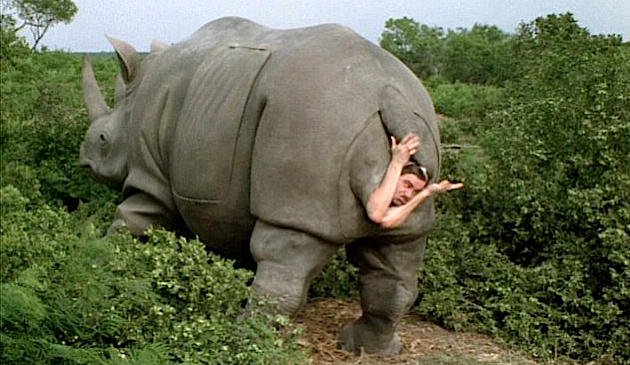
Another tool to catch poachers...
Posted on 06/22/2013 11:23:03 PM PDT by nickcarraway
The University of Maryland Institute for Advanced Computer Studies’ Terrapin One drone is meant to let South African poachers know what “fear the turtle” is all about.
On May 26, during the drone’s first night flight, it aided in capturing a group of poachers spotted threatening a mother rhinoceros and her calf. The project — which programs the movements of the drone, loaned to the team by Denver-based manufacturer Falcon UAV — is the creation of Tom Snitch, a member of the Board of Visitors of UMIACS, and institute scientists. Based on the data they gathered during test flights in South African wildlife preserves, drones could be the answer to the dwindling wildlife numbers around the globe.
From May 23 to June 4, the drone flew day and night in South Africa, doing everything from looking for poachers to discovering rhino locations. The UMIACS team was able to reposition rangers with the information they gathered, enabling them to arrest poachers or chase them away. Snitch and his team guided the drone with a set of equations and models based on the past locations of rhinos, poaching “hot spots” and ranger deployment patterns.
“Rhinos are really the ones suffering the most from local poaching — about five rhinos are killed a day just in the Kruger National Park,” said Snitch, who is also the executive officer of the U.N.’s Wildlife Enforcement Monitoring System. “The number of rhinos is falling so dramatically — already, over 300 rhinos have been killed in 2013 in South Africa alone.”
Globally, rhino horns are in high demand. They are believed to treat everything from strokes and fevers to hangovers and convulsions, and some believe the horns can act as an aphrodisiac. NPR reported in May that in Vietnam rhino horns sell for about $1,400 an ounce — about the same price as gold.
Snitch and his team decided to apply drone technology to solving the problem and spent the past two years developing and implementing the Terrapin One project. In total, the group kept the cost at less than $5,000 thanks to frequent-flyer miles, stays in research camp facilities and the deal with Falcon UAV.
The biggest challenge was getting permission to fly the drones in Africa, Snitch said. Local officials in Olifant West finally conceded on the condition that the drones flew below 800 meters.
With the project’s success comes a new application for drones, which have been controversial in the U.S. By following the models and equations that the UMIACS team developed, it is now possible to determine where threatened or endangered animals are and where poachers might be, Snitch said.
“It’s not infringing on anyone’s rights,” said Amber DeMarr, the president of this university’s Wildlife Society chapter. “Maybe African governments will take more responsibility and commit more money and resources to the project for further drone research to protect these animals.”
Besides protecting the rhinos, the drone flights were able to track elephant herds and wild dogs at night for the first time ever.
In the near future, Snitch said he hopes his team will also be able to use drones to discover where gorillas nest in trees at night, a feat yet to be accomplished. Additionally, they hope to develop a poaching model specific to any endangered animals’ living conditions, enabling those threatened species’ populations to expand.
While there are multiple solutions to poaching, including the use of motion-sensor cameras, the effective use of these tools in a multi-pronged approach depends on the situation and poaching threat in a particular area, said Kirsty Brebner, the Endangered Wildlife Trust’s rhino project manager. “The next step is to try and raise funding to deploy a drone, which could be used for all endangered species in an area,” Brebner wrote in an email. Meanwhile, negative attitudes about drones could change with this new use. “I never would’ve thought to use drones to protect an endangered species,” said Connor Speer, a sophomore cell biology and genetics major.
Tom Snitch....
>>“Maybe African governments will take more responsibility and commit more money and resources to the project for further drone research to protect these animals.”
Does he really think politicians don’t get a cut of the profits?

Another tool to catch poachers...
Oh, so that’s where RINOS come from!
Bury poachers where they’re found, fertilize the ground.
How good of the U of M researchers.
Too bad they didn’t stay home and prevent the Godless murder of millions of babies.
ROTFL!
That's the statement of fact and picture for proof of the century!
Disclaimer: Opinions posted on Free Republic are those of the individual posters and do not necessarily represent the opinion of Free Republic or its management. All materials posted herein are protected by copyright law and the exemption for fair use of copyrighted works.